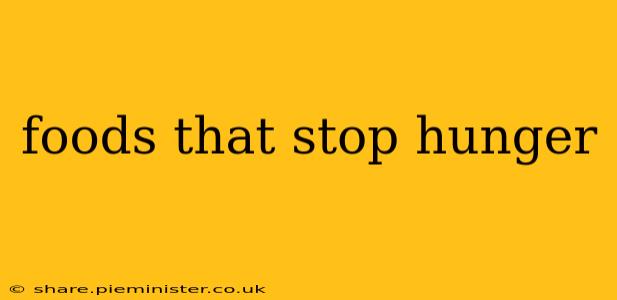Feeling constantly hungry? It's a frustrating experience that can derail even the best intentions when it comes to healthy eating and weight management. The good news is that you can strategically choose foods to help curb your appetite and keep those hunger pangs at bay. This isn't about restrictive dieting; it's about making smart food choices that promote satiety and overall well-being.
What Makes You Feel Full?
Before we dive into specific foods, let's understand what contributes to the feeling of fullness, or satiety. Several factors play a role:
- Fiber: High-fiber foods absorb water, expanding in your stomach and creating a feeling of fullness. They also slow down digestion, preventing blood sugar spikes and subsequent crashes that trigger hunger.
- Protein: Protein is a crucial component of satiety. It takes longer to digest than carbohydrates, leading to sustained feelings of fullness.
- Water: Sometimes thirst masquerades as hunger. Drinking water before a meal can help you feel fuller and consume fewer calories.
- Fat: Healthy fats, like those found in avocados and nuts, also contribute to satiety. They're calorie-dense, so moderation is key.
- Volume: Bulky, low-calorie foods like vegetables can fill you up without adding many calories.
Foods That Effectively Stop Hunger
Now, let's explore some specific foods known for their hunger-busting properties:
High-Fiber Foods:
- Oats: A fantastic source of soluble fiber, oats absorb water and form a gel-like substance in your stomach, promoting fullness. Enjoy them as oatmeal, in baked goods, or even as a binder in veggie burgers.
- Legumes (beans, lentils, chickpeas): Packed with fiber and protein, legumes are a powerhouse for satiety. They're incredibly versatile and can be added to soups, salads, stews, or enjoyed as a side dish.
- Fruits (apples, berries, avocados): Many fruits contain both fiber and water, contributing to fullness. Apples, in particular, are known for their high fiber content. Avocados, while higher in fat, provide healthy fats and fiber.
- Vegetables (broccoli, spinach, Brussels sprouts): Low in calories but high in volume and fiber, vegetables are ideal for filling you up without overdoing it on calories.
High-Protein Foods:
- Eggs: A classic breakfast choice, eggs are an excellent source of protein, keeping you feeling full and energized.
- Greek Yogurt: Higher in protein than regular yogurt, Greek yogurt is a great snack or addition to meals.
- Lean Meats (chicken breast, turkey, fish): Lean protein sources provide sustained energy and satiety without excessive fat.
- Nuts and Seeds: While calorie-dense, nuts and seeds offer a good balance of protein and healthy fats, helping to curb hunger.
Other Hunger-Busting Foods:
- Popcorn (air-popped): A whole-grain snack, air-popped popcorn is high in fiber and low in calories. Avoid heavily buttered or salted varieties.
- Soup (broth-based): The liquid volume in soup can contribute to feelings of fullness, particularly if it contains vegetables and lean protein.
H2: What foods should I eat to feel full longer?
The foods listed above—high-fiber options like oats, legumes, fruits, and vegetables; high-protein choices such as eggs, Greek yogurt, and lean meats; and other satiating foods like air-popped popcorn and broth-based soups—are all excellent choices for promoting prolonged feelings of fullness. The key is to combine these food groups for optimal results. A meal containing protein, fiber, and healthy fats will keep you satisfied for much longer than a meal lacking these components.
H2: How can I reduce my hunger naturally?
Beyond specific foods, several lifestyle strategies can help reduce hunger naturally:
- Regular Meal Timing: Eating at regular intervals prevents extreme hunger and helps regulate blood sugar levels.
- Mindful Eating: Paying attention to your hunger and fullness cues can help you avoid overeating.
- Sufficient Sleep: Lack of sleep can disrupt hormones that regulate appetite, leading to increased hunger.
- Stress Management: Stress can also affect appetite and lead to increased cravings. Finding healthy ways to manage stress is crucial.
- Staying Hydrated: Drinking plenty of water throughout the day can help distinguish between thirst and hunger.
H2: What are some healthy snacks to keep hunger at bay?
Healthy snacking is crucial for managing hunger between meals. Good choices include:
- A handful of almonds or walnuts
- An apple with peanut butter
- Greek yogurt with berries
- A hard-boiled egg
- Vegetable sticks with hummus
Remember, choosing the right foods is only part of the equation. Combining smart food choices with a healthy lifestyle that includes regular exercise, sufficient sleep, and stress management will lead to lasting satiety and overall well-being. If you continue to experience persistent or excessive hunger, consult a doctor or registered dietitian to rule out any underlying medical conditions.
